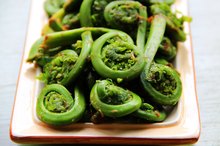Can You Eat Acorn Squash Seeds?
Whether they came from a bag or straight from the fruit, you’ve probably tasted pumpkin seeds. Pumpkins aren’t the only winter squash that contain edible seeds; however, you can eat the seeds of virtually any squash variety, including acorn squash.
Packed With Nutrients
Acorn squash seeds are nutritionally comparable to pumpkin seeds. They’re packed with protein, heart-healthy unsaturated fatty acids and dietary fiber; whole squash seeds supply more than 5 grams of fiber per 1-ounce serving, according to the U.S. Department of Agriculture. The interior kernels are an excellent source of iron, magnesium, phosphorus, vitamin E and zinc.
Before You Eat Them
The Nutritional Value of African Oil Bean Seeds
Learn More
Like all squash seeds, the seeds in an acorn squash must be separated from the fruit’s slimy guts before you can eat them. Rinse them clean in a colander, using your fingers to remove any clinging fibers. Spread the seeds out on a towel and allow them to dry thoroughly.
Raw, Dried or Roasted
You can eat raw acorn squash seeds, but drying or roasting them enhances their rich nutty flavor. Use a dehydrator or a warm oven to dry the seeds. Alternatively, toss them with olive oil, spread them on a foil-lined baking sheet and roast them in a 250-degree oven for 10 minutes, or until they begin to brown.
Related Articles
References
- Wellness Foods A to Z: An Indispensable Guide for Health-Conscious Food Lovers; Sheldon Margen, M.D.
Writer Bio
Based just outside Chicago, Meg Campbell has worked in the fitness industry since 1997. She’s been writing health-related articles since 2010, focusing primarily on diet and nutrition. Campbell divides her time between her hometown and Buenos Aires, Argentina.









